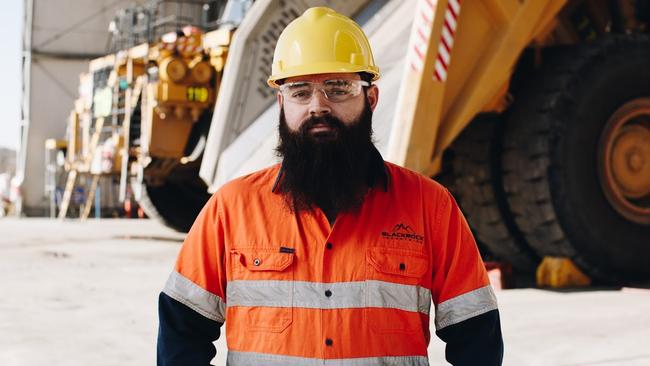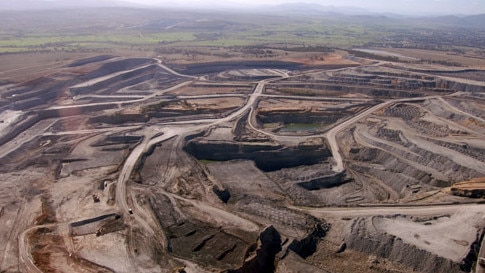Indigenous jobs program driving ‘real, lasting change’ in community
One man is fostering Aboriginal employment in the local mining, construction and industrial-supply industries, and in many cases, creating the jobs from scratch.

The central paradox of indigenous advancement in Australia and in closing many of the economic, demographic and health disparities between Indigenous and non-Indigenous Australians is that meaningful participation in the economy is crucial — but for many Indigenous Australians, the resources industry is the biggest (if not the only) part of the economy that exists where they live.
While that is more pronounced in, say, the iron-ore industry and other metals-mining sectors, the coal industry is picking up speed in its efforts to emulate that lead.
“We look at the kind of numbers that come out of Fortescue Metals Group, and that is the crown jewel of what should be happening,” says Steven Fordham, co-founder and chief executive of Blackrock Industries, an Indigenous-owned and operated business that specialises in earthworks, mine rehabilitation, demolition, fencing, construction, cleaning and labour-hire services for the coalmining industry in the Hunter Valley. Across his organisation he has 300 employees, about 200 of whom are Indigenous.
Fordham says numbers such as Fortescue’s — 15 per cent Aboriginal employment across its Pilbara operations; $2.5bn in work contracts awarded to Aboriginal-run businesses and joint ventures; and more than 900 Aboriginal graduates of the company’s Vocational Training and Employment Centre (VTEC) program employed — constitute “real and lasting change” in Indigenous lives.
“It’s real change, and it’s change that governments can’t achieve,” Fordham says.
“Fortescue doesn’t give people a fish; it teaches people how to fish. I’ve always said, if you want to ‘fix the gap’, give us the opportunities and we’ll do it ourselves. The big thing about Aboriginal enterprise is that we employ Aboriginal people.”
The 29-year-old Kamilaroi man co-founded Blackrock Industries with an aim of fostering Aboriginal employment in the local mining, construction and industrial-supply industries, managing the employment life cycle from recruitment and training through to employment and mentoring — and in many cases, creating the jobs from scratch.
From the start, the coalmining industry was the logical place to look for work. In 2016, the 25-year-old Fordham and his partner turned up at MACH Energy’s Mount Pleasant open-cut thermal coal mine — construction of which was just starting — with an old tipper and $20,000 in the bank, and asked if there were any tasks they could do. Luckily, the mine needed a fence built, and Blackrock Industries was on its way.
Fordham has since partnered with the St Heliers Correctional Centre in his home town of Muswellbrook, establishing the Second Chance for Change (SCFC) Project, which aims to provide Indigenous incarcerated men the opportunity to engage in long-term, stable employment opportunities, which he believes will help with reducing recidivism rates.
Eligible participants are offered both pre- and post-employment training and mentoring, and begin work a year or so before their sentences expire, on day release.
Again, the coalmining strength of the area made it the logical first call. MACH Energy at Mount Pleasant, and BHP’s open-cut Mt Arthur thermal coal mine — the largest individual coal production site in the Hunter Valley — agreed to trial the concept. Sixty inmates have now gone through SCFC — 55 of them Indigenous — and only one has returned to prison.

“The absolute basis of it is finding them meaningful work, to start the process of rebuilding their lives,” Fordham says.
“The stigma associated with past mistakes and incarceration, even for low-grade sentences and crimes, often excludes ex-prisoners from getting on with their lives.
“For many of these guys, gaining meaningful employment post-release is the key to them gaining economic independence, a sense of place in the local community and breaking the cycle of reoffending.
“Mining is perfect for this task,” he says.
“The biggest thing about mining is that safety is the number one, two and three consideration, so drugs and alcohol are not tolerated. My guys have no chance of that, because they are being random-tested so often in jail.
“The second biggest thing is that the mining industry isn’t as hard as what a lot of people make it out to be, especially for opportunities driving trucks. It’s a couple of weeks, and you get the hang of it; a couple of months, and then you’re qualified.
“And then you’re not getting paid $70,000 a year as a token to sit there, you’re actually part of the team, you’re in the operation. Our SCFC candidates know that.”
Fordham says some of the SCFC participants leave jail with savings of $50,000 or more, or have rebuilt family lives by channelling all of their pay to their wives or partners — but they leave with something even more important.
“They’ve regained their self-respect — and in most cases, they have an ongoing job,” he adds.
“And that’s the difference that we provide. It’s not easy — with some of them we have to work with them every day, because their old life was the only one they knew for a long time.”
Fordham says his short-term goal is to rehabilitate 100 Indigenous inmates in the Muswellbrook area by 2022, in turn strengthening the community by reducing reoffending, and increasing community engagement.
Longer-term, with Federal Government support, he hopes to do the same thing across Australia.
Ferdian Purnamasidi, managing director at MACH Energy, says Fordham’s initial enthusiasm and passion to ensure local Aboriginal people had the same chance as everyone else when it came to securing work opportunities has never faulted.
“Steven’s regular visits to site are packed with as much, if not more, eagerness and devotion to his cause than his first day building a fence,” Purnamasidi says. “We’re proud to be able to work with him and his team, and we’ll continue to support Blackrock and other local Aboriginal organisations.
“This commitment is easy to make when we know that Steven is employing locals, using a buy-local strategy and works tirelessly to strengthen the Muswellbrook community in which he lives and works.”
‘All we want is to have the opportunity to progress, make money, be able to build, strengthen ourselves and give ourselves real hope — and the mines do that’
— Steven Fordham, co-founder and CEO, Blackrock Industries
While the coal industry is behind its iron-ore, gold and metals counterparts, Fordham says it is rapidly improving. It has adopted the Business Council of Australia’s Raising the Bar initiative, under which companies pledged to hit a target of 3 per cent of procurement spending on Indigenous suppliers within five years.
“The industry can do better, and I think they’re a bit embarrassed by the likes of Fortescue’s efforts, but companies are starting to go above and beyond,” Fordham says.
“They’re starting to think in terms of mandatory Indigenous targets on their contracts, and more companies are thinking like MACH, which is putting a fortune back into the community every year through its Aboriginal Community Development Fund (ACDF), investing into health and measurement and entrepreneurship. Companies are aware that it’s an essential part of their social licence to operate, and beyond that, it’s the right thing to do as a part of the community they operate in.”
Certainly, the big producers are starting to act. Whitehaven Coal says that 9 per cent of its workforce identifies as Indigenous, and starting with employment and procurement — $3.2m spent with nine Indigenous suppliers in FY20 — it is supporting its local communities through “intergenerational forms of support” such as family support, healthcare, education and training, and cultural awareness training for its employees,
Glencore Coal and Indigenous-owned business Diversified Building Services (DBS) have partnered to expand an Indigenous employment pathways program in central Queensland. The program, which started in February, aims to provide employment opportunities for an initial group of 20 Indigenous Australians with connections to the land close to several Glencore coal operations.
At BHP Mitsui Coal’s Poitrel operation in Queensland, a partnership with labour hire services provider Mickala Mining has employed 43 Indigenous workers (more than 70 per cent of them female) in three years.
The pilot program has lifted BMC Poitrel’s Indigenous workforce more than sixfold, from 1.8 per cent to 11.6 per cent, well ahead of BHP’s target for Indigenous employment across its Australian operations of 5.75 per cent of its total workforce by the end of 2020.
“I think the industry is really pushing hard now, to get to where it should be,” Fordham says.
“There’s some really good leaders. There’s Malabar Coal, which hasn’t opened yet (it is proposing turning the old Drayton South open-cut coal mine in NSW into an underground mine that would recover 148 million tonnes of run-of-mine coal over a period of 26 years, and inject $509m in capital investment value into the economy), they’ve been giving work and opportunities for us as well.
“It’s not just employment, it’s procurement and contracts with supplier businesses that are Indigenous-owned, and community support through healthcare and education and sponsorship,” Fordham says.
“At the end of the day, the mines are on Indigenous land, we want to live in our countries, live in our areas, and provide our people with opportunities for progression.
“All we want is to have the opportunity to progress, make money, be able to build, strengthen ourselves and give ourselves real hope — and the mines do that. There’s an obligation, and there’s targets, and we want to work with them as much as we can.”


